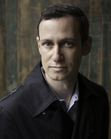The Exclusion Zone
Having grown up in fear of nuclear catastrophe, the post-earthquake turmoil at the Fukushima reactors has really knocked me for a loop. From the moment the plants' administrators started issuing mealy-mouthed explanations about the situation, I knew that disaster was imminent. The big question now is not only how much radiation will blow toward Japan's major population centers, but what will become of the area around the plants. Land is an incredibly precious resource in Japan, given its relatively tiny size and large population. Let's assume that, whether by official edict or mere consumer prefer, a terrestrial semi-circle behind the plant becomes devoid of inhabitants for several years. Let's also assume that the radius of this semi-circle is 30 kilometers, equivalent to that of the "exclusion zone" around Chernobyl. That comes out to around 1,413 square miles, or roughly 1 percent of Japan's total land mass. (No, I'm not controlling for national parks, inland lakes, and other variables—go with it.) In the American terms, the equivalent would be roping off a piece of property the size of Delaware and Rhode Island combined (plus a few hundred miles more).
It's heady stuff to contend with, but I've found some comfort by thumbing through Haruki Murakami's Underground, one of my all-time favorite works of non-fiction. An oral history of the Tokyo gas attacks of 1995, Underground provides a slew of tiny moments that attest to the Japanese public's ability to cope with the unthinkable. I've previously written about the subway attendant who took time to fix his tie and hair despite suffering the ill effects of sarin; now I'd like to turn your attention to the recollections of an accountant whose daily ritual once consisted of buying milk in Shinjuku. Nothing, it seems, could keep him from that appointed task on the day of the attacks:
It was around Yotsuya Station I first felt sick. My nose ran all of a sudden. I thought I'd caught a cold, because I started to feel empty-headed, too, and everything before my eyes grew dark, like I had sunglasses on.
At the time, I was scared it was some kind of brain hemorrhage. I'd never experienced anything like it before, so I naturally thought the worst. This wasn't just a cold; it was a lot more serious. I felt as though I might keel over any minute.
I don't remember much about the others in the car. I was too concerned about myself. Anyway, somehow I made it to Shinjuku-gyoemmae and got off. I was dizzy; everything was black. "I'm done for," I thought. Walking was a terrific struggle. I had to grope my way up the steps to the exit. Outside it might as well have been nighttime. I was in pain, yet I still bought my milk as usual. Strange, isn't it? I went into the AM/PM store and bought some milk. It didn't even occur to me not to. Thinking back on it now, it's a mystery to me why I'd buy milk like that when I was in such agony.
Actually, I sort of get it. Routines serve an important function—they're evidence that all is normal. And when things go awry, you try to stick to that routine to convince yourself that the chaos around you is an illusion, that you're still in control. Such a strategy has little chance of working on an individual level—this poor accountant collapsed soon after purchasing his milk. But if an entire population commits to continuing to go through the motions of daily life, however difficult, virtually any catastrophe can be overcome.




